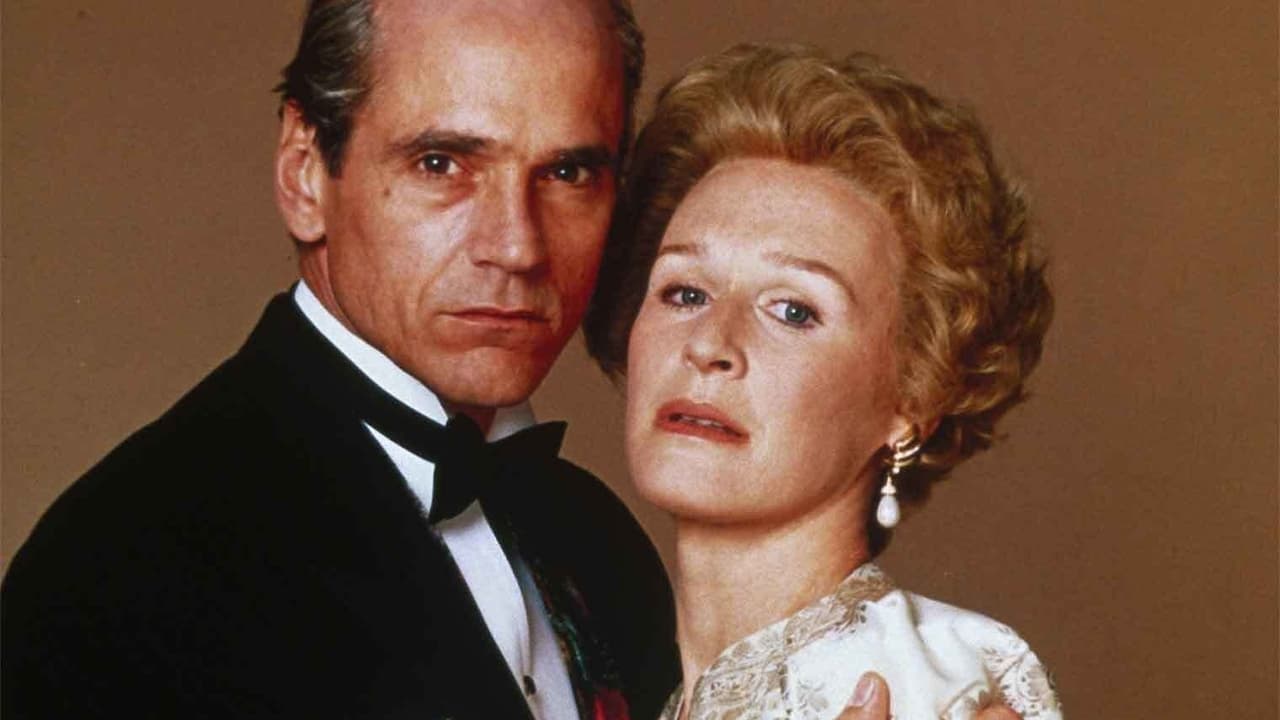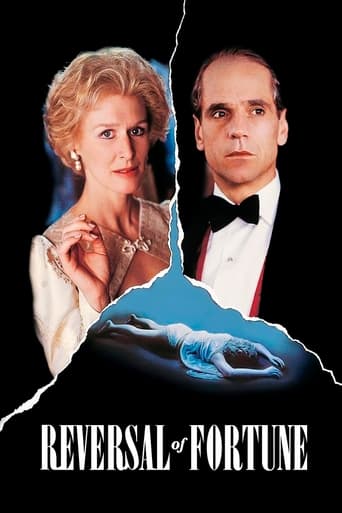

The words of this review title happened to be written in pen on the videotape box of this movie that I checked out of the library. Whoever wrote them told no lie.The movie is based on Alan Dershowtiz's book of the same title, where he takes on the appeal of the attempted murder conviction of socialite Klaus von Bulow, who allegedly tried to murder his wife Sunny through an injection of insulin. Dershowitz tells this to his group of college-age legal helpers, one of whom tries to drop out in disgust, but Dershowitz changes her mind by telling her that the idea is to get the money to continue their pro bono legal quest to help two young black ghetto kids who are also facing criminal charges. Dershowitz also mentions that the state of Rhode Island's judiciary has a corrupt legal system. Also, when they do a test of how liquid coats straws, it suggests that the evidence that von Bulow might have injected Sunny with insulin might not be so real after all.Jeremy Irons gives a good performance as an icy, haughty aristocrat, both in his scenes with Dershowitz and his legal team and with the flashback scenes with him and Sunny. Also, Dershowitz is shown as haughty and pompous in his own right, even if his heart is supposedly in the right place. And the movie does not make any conclusions as to whether von Bulow was guilty or not; no surprise when Dershowitz's tactic was to cast doubt on the evidence that his client actually made any attempt to kill his wife, even if he had a motive to do so. Indeed, the movie implies that Sunny had mental problems and was probably suicidal.Dershowitz might have wanted to come across as a hero doing his job. The latter is certainly true, but he has proved no more heroic than any other defense lawyer.
... View MoreOn 27 December 1979, the millionaire Sunny von Bülow (Glenn Close) is found in coma for the second time in her bathroom with an overdose of insulin. Her European husband Claus von Bülow (Jeremy Irons) is convicted for attempted murder of Sunny, but he hires the expensive Harvard Professor Alan Dershowitz (Ron Silver) to revert his sentence. Dershowitz teams up with his students to collect evidences to disprove the accusation and prove the innocence of Claus. "Reversal of Fortune" is the dramatization of a true story based on the book of Alan M. Dershowitz. The originality of the screenplay is that it details the work of Dershowitz and his students to disprove the prosecution and the trial itself is just glanced. I do not like this type of inconclusive films based on true stories since the truth is not disclosed. My vote is six.Title (Brazil): "O Reverso da Fortuna" ("The Reversal of the Fortune")
... View MoreOn 21st December 1980 Martha ("Sunny") von Bülow, the wife of the aristocratic Danish socialite Claus von Bülow, collapsed at the family's mansion in Newport, Rhode Island, and fell into a coma from which she never recovered. (She eventually died in 2008). Claus was accused of attempting to murder his wife by injecting her with insulin. The prosecution alleged that his motives were financial; his wife, an heiress in her own right, was considerably wealthier than him, and it was alleged that after her death he hoped to use her fortune to marry his mistress. At his first trial Claus was convicted and sentenced to thirty years imprisonment. This verdict was quashed on appeal, and he was subsequently acquitted in a second trial. There have been a number of good films, such as "In the Name of the Father" and "Let Him Have It" which have told the true stories of real-life miscarriages of justice, but "Reversal of Fortune" is not really a film of this type. As Claus von Bülow was eventually acquitted, the film-makers could not, without inviting a writ for libel, imply that he was guilty of the attempted murder, but for some reason they seemed equally unwilling to state definitively that he was innocent. (Possibly because they were unwilling to offend that large section of American public opinion which had taken a dislike to a supercilious European aristocrat and had judged him guilty). Consequently, we do not see very much of his life with Sunny (and what we do see is shown in flashback), and we see nothing of the first trial in which he was convicted. Jeremy Irons was awarded the Academy Award for Best Actor for his portrayal of von Bülow, although I have never understood why. It is not in my view Irons' best performance; he has given better ones in "The French Lieutenant's Woman" and "The Mission", which came before "Reversal of Fortune", and in the likes of "Waterland", "The House of the Spirits", and even "Damage", which came after it. None of these films even brought him a nomination. Nor in my view was this the best acting performance in 1990; that to my mind was Kevin Costner in "Dances with Wolves", although Gerard Depardieu might also have had a claim for "Cyrano". The Academy, however, doubtless felt that Costner would have to be content with "Best Picture" and "Best Director" and that to give him a third award might make him big-headed. As for Depardieu, the Academy has always had a bias in favour of American movies and against foreign ones, especially foreign-language ones. (In 1990 no actor had ever won "Best Actor" for a foreign-language performance). Irons' performance here is not a bad one, but it is to my way of thinking too one-dimensional to be worthy of an Oscar. He plays von Bülow as a cold, self-absorbed individual, speaking throughout in the sort of aristocratic British accent that today even most British aristocrats would find a bit too fruity for their tastes. (Although von Bülow was Danish by birth, he was educated in England). He never displays any real emotion; neither the tragic fate of a woman he once loved, nor the prospect of having to spend thirty years in jail, can rouse him to any display of feelings. Although the film never directly states that von Bülow was guilty as charged, we never feel for him the sort of sympathy we would normally feel for a man wrongly accused, and on an emotional level it would be all too easy to visualise Irons' character as a man quite capable of trying to murder his wife for her money. Indeed, in many ways the film is more about von Bülow's lawyer Alan Dershowitz than it is about von Bülow. (This is not surprising, given that it was based upon Dershowitz's book about the case). Dershowitz is portrayed as a left-liberal radical lawyer, who takes the case less because he is convinced of his client's innocence but because he believes that important principles of law, particularly those relating to the admissibility of evidence, are at stake. The film concentrates upon the appeal proceedings in which Dershowitz persuaded the Rhode Island court of appeals to overturn the original conviction, but appeal hearings, which largely deal with technical points of law, do not generally make for great excitement, and the chance to make the film a courtroom drama was passed up. Unfortunately, the film does not find any alternative sources of excitement. The story is too slow-moving for my liking and the overall emotional temperature is far too cool. Whereas in films like In the Name of the Father" and "Let Him Have It" I could empathise with the plights of Gerry Conlan and Derek Bentley, in "Reversal of Fortune" I ended up not caring whether von Bülow was acquitted or not. 5/10
... View MoreI had mainly heard of this film because of the leading actor winning an Oscar, and based on a true story it sounded interesting and certainly worth a try. Basically Claus Von Bülow (Oscar and Golden Globe winning Jeremy Irons) is accused of attempting to murder his wife Martha 'Sunny' (Glenn Close), who has gone into a deep coma. Claus has hired brilliant Professor of law, Alan Dershowitz (Ron Silver), to try and get him acquitted after being found guilty on two convictions. Through a series of flashbacks you find out how Claus and Sunny met each other, how their marriage was slowly breaking down, and a few flashes of how the accused incident could have gone. The only problem with Claus hiring Dershowitz is that he and his are students are confident that he is guilty, and they are actually trying to prove his innocence, and unbelievably, they succeeded! The end text says that Claus lived a reasonably normal life after he got off, and Sunny never woke from her coma. Also starring The Hand That Rocks the Cradle's Annabella Sciorra as Sarah, Uta Hagen as Maria - Sunny's Personal Maid, Fisher Stevens as David Marriott, Jack Gilpin as Peter MacIntosh - Dershowitz's Student Staff, Christine Baranski as Andrea Reynolds - Claus' Girlfriend, Stephen Mailer as Elon Dershowitz, Christine Dunford as Ellen and Desperate Housewives' Felicity Huffman as Minnie - Dershowitz's Student Staff. Irons makes an interesting performance with a slight German twang in his accent, Close (also narrating) does well in her flashback sequences, and Silver is pretty good, it is an interesting story worth watching. It was nominated the Oscars for Best Director for Barbet Schroeder and Best Writing, Screenplay Based on Material from Another Medium, and it was nominated the Golden Globes for Best Motion Picture - Drama, Best Director and Best Screenplay. Very good!
... View More